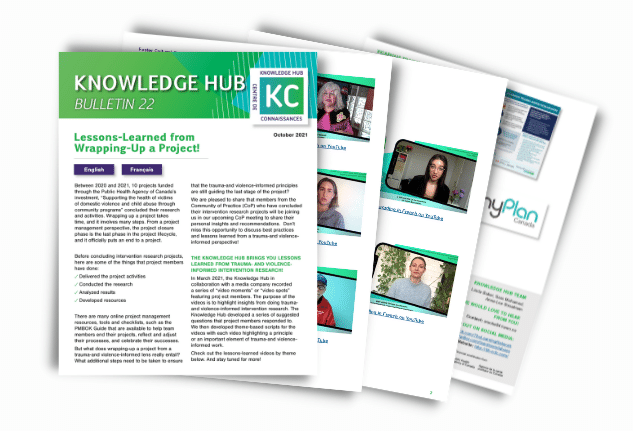Bulletin 22 - October 2021
Lessons-Learned from Wrapping-Up a Project!
Between 2020 and 2021, 10 projects funded through the Public Health Agency of Canada’s investment, “Supporting the health of victims of domestic violence and child abuse through community programs” concluded their research and activities. Wrapping up a project takes time, and it involves many steps. From a project management perspective, the project closure phase is the last phase in the project lifecycle, and it officially puts an end to a project.
Before concluding intervention research projects, here are some of the things that project members have done:
- Delivered the project activities
- Conducted the research
- Analyzed results
- Developed resources
There are many online project management resources, tools and checklists, such as the PMBOK Guide that are available to help team members end their projects, reflect and adjust their processes, and celebrate their successes. But what does wrapping-up a project from a trauma-and violence-informed lens really entail? What additional steps need to be taken to ensure that the trauma-and violence-informed principles are still guiding the last stage of the project? We are pleased to share that members from the Community of Practice (CoP) who have concluded their intervention research projects will be joining us in our upcoming CoP meeting to share their personal insights and recommendations. Don’t miss this opportunity to discuss best practices and lessons learned from a trauma-and violence-informed perspective!
THE KNOWLEDGE HUB BRINGS YOU LESSONS LEARNED FROM TRAUMA- AND VIOLENCE-INFORMED INTERVENTION RESEARCH!
In March 2021, the Knowledge Hub in collaboration with a media company recorded a series of “video moments” or “video spots” featuring project members. The purpose of the videos is to highlight insights from doing trauma[1]and violence-informed intervention research. The Knowledge Hub developed a series of suggested questions that project members responded to. We then developed theme-based scripts for the videos with each video highlighting a principle or an important element of trauma-and violence-informed work. Check out the lessons-learned videos by theme below. And stay tuned for more.
- Foster Cultural Connectedness and Safety Lessons Learned from Trauma-Informed Intervention Research: Foster Cultural Connectedness & Safety - YouTube
- Foster Engagement Lessons Learned from Trauma-and Violence-Informed Intervention Research: Foster Engagement - YouTube
- Trauma-Informed Practice Impacts Facilitators - Lessons Learned from Trauma-Informed Practice: Trauma-informed practice impacts facilitators - YouTube
- Trauma-Informed Learning is Integrated into Daily Life Trauma-informed learning is integrated into daily life - YouTube
- Empowerment is Fundamental Lessons Learned from Trauma-and Violence-Informed Intervention Research: Empowerment is fundamental - YouTube
VICARIOUS TRAUMA AMONG RESEARCHERS
The Knowledge Hub is continuously looking for creative ways to better promote the working group report, "Toward A Trauma- And Violence-Informed Research Ethics Module: Considerations And Recommendations”. Check out this infographic that we have re-created from the report! We are sharing the infographic on social media with a link to the report. Please share and circulate with your networks!
Vicarious Trauma among Researchers
NEW APP!
Marilyn Ford Gilboe, Colleen Varcoe and Kelly Scott-Storey are pleased to announce that they are partnering with an innovative Canadian media company to create a new health, wellness and safety app. Hosted in Canada, the App will be based on Canadian research and best practices in user-centered design and include new features that extend its usefulness for both women and for those who support women. In particular, they are drawing on research to emphasize the importance of supporting the health of women who experience violence. They are expecting to have a prototype ready in 2022. Stay tuned and support this important tool! My Plan App

